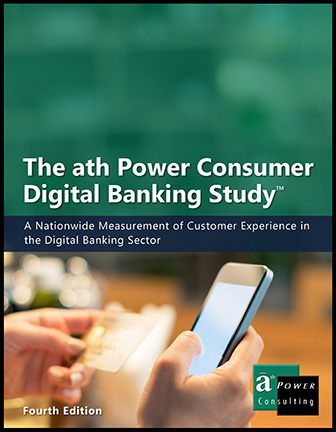Description
With today’s consumers embracing all things mobile in their omnichannel retail shopping experiences. It’s logical – and inevitable – that banking customers would be demanding greater functionality and convenience from their online and mobile banking solutions.
To better respond to this important shift, financial institutions are working hard to find the solutions that best meet the needs of all banking customers, no matter how they access their account information. Consequently, many progressive banks and credit unions are introducing digital banking platforms, which includes key elements of both legacy online and newer mobile banking variants.
The ath Power Consumer Digital Banking Study™ covers the specific reasons why more and more customers are choosing to use online and mobile banking – and new digital banking platforms that combine the best elements of each. Readers will see why digital banking has become the go-to channel for today’s banking customers, as well as the challenges FIs are facing when offering digital banking solutions.
The report also identifies areas where financial institutions and their fintech partners are potentially deficient in meeting banking customers’ expectations. This is a perplexing situation for FIs, as they have amassed so much customer data, and are considered the most trusted provider of banking services. Yet, many have done relatively little to learn from this information to better serve their customers’ evolving digital banking and broader financial services needs.
Purpose of The ath Power Consumer Digital Banking Study™
The ath Power Consumer Digital Banking Study™ is a one-of-a-kind, detailed assessment of banking customer usage and intention, product and service offerings, delivery methods, and customer experiences with their financial institutions’ digital banking solutions. This study includes deep insight on digital banking features that are of great interest to users, and what banks and credit unions need to do to deliver the customer experiences that will ultimately increase acquisition, improve retention and loyalty, and drive revenue.
The study also identifies areas that, while important, do not resonate as strongly with today’s banking customers. Insights and recommendations in the study will help financial institutions determine how best to build and expand digital capabilities, determine which digital banking strategies are best for banking customers, and which investments in time, money, and effort will yield the greatest return in both revenues and customer satisfaction.
- Discover what digital banking features are of great interest to banking customers, and whether or not they are satisfied with their current experience.
- Find out what gaps in the service experience would deter a potential digital banking customer from bringing their business to a bank or credit union.
- Identify areas where financial institutions and their fintech partners are potentially deficient in meeting banking customers’ expectations
- Explore how digital solutions can be employed to more fully engage with banking customers, increase share-of-wallet, often across traditional geographic boundaries, and create a winning customer experience in their organizations
- Obtain valuable information that can help target strategic sales and service initiatives within the digital banking arena.
- Gain the strategic insight needed to achieve a dominant position in the important digital banking market.
Methodology
During January 2017, just over 3,000 retail banking consumers responded to an online survey composed of questions designed to identify factors that determined satisfaction with their digital experience, and to uncover impediments to producing such an experience. Of the 3,000 respondents, 2,400 identified themselves as current mobile banking users. Through this evaluation, consumers provided information about their current digital banking behaviors, the features and functionality they value or would like to see added, and an assessment of their current digital banking experience.






